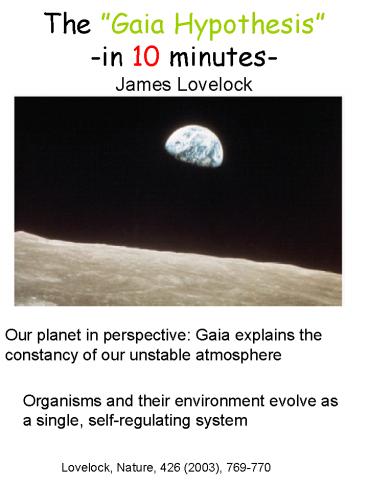The Gaia Hypothesis in 10 minutes James Lovelock PowerPoint PPT Presentation
Title: The Gaia Hypothesis in 10 minutes James Lovelock
1
The Gaia Hypothesis-in 10 minutes- James
Lovelock
Our planet in perspective Gaia explains the
constancy of our unstable atmosphere
Organisms and their environment evolve as a
single, self-regulating system
Lovelock, Nature, 426 (2003), 769-770
2
The Gaia Hypothesis-in 10 minutes-
- Gaia The Greek Earth goddess
- Name suggested by the novelist William Golding
- Dr. James Lovelock Chemist
- Dr. Lynn Margulis Microbiologist
- ...the physical and chemical condition of the
Earths surface, atmosphere and oceans has been,
and is actively made fit and comfortable by the
presence of life itself From Gaia A new look
at life on earth (1979) - Model of the Earth as a complex interacting
system that can be thought of as a single
organism. Encyclopaedia Britannica
3
The Gaia Hypothesis-in 10 minutes-
- Evolution through manipulation of the abiotic
environment - Earth as a superorganism?
- Novel idea?
- J. Hutton (1726-1797) - geophysiology
- L. Thomas ...like a single cell
- Various religions
- Science vs. New Age
- Speculative adaptations
- Man as Gaias nervous system?
- Green light for pollution?
- Reproduction?
- Etc.
4
The Gaia Hypothesis-in 10 minutes-
- Weak (or influential) Gaia hypothesis
- Life influences earth (planetary) processes, i.
e. has substantial effects on abiotic processes.
Generally supported. - Strong (or optimizing) Gaia hypothesis.
- Life controls planetary processes. Little
support.
5
The Gaia Hypothesis-in 10 minutes-
- The Science
- Daisyworld
6
The Gaia Hypothesis-in 10 minutes-
- A possible mechanism for temperature control
- Di-methylsulfide (CH3-S-CH3) is produced by
phytoplankton in the oceans. - Oxidized in the atmosphere to form cloud
condensation nuclei - Clouds affect temperature
7
The Gaia Hypothesis-in 10 minutes-
- James Kirchner (UC Berkeley)
8
The Gaia Hypothesis-in 10 minutes-
- Theory vs. Metaphor
- ..a theory that is untestable is far worse than
one that is merely false - Lovelock Perhaps its Gaias value lies in its
metaphor of a living earth. Which reminds us that
we are part of it and that human rights are
constrained by the needs of our planetary
partners.
PowerShow.com is a leading presentation sharing website. It has millions of presentations already uploaded and available with 1,000s more being uploaded by its users every day. Whatever your area of interest, here you’ll be able to find and view presentations you’ll love and possibly download. And, best of all, it is completely free and easy to use.
You might even have a presentation you’d like to share with others. If so, just upload it to PowerShow.com. We’ll convert it to an HTML5 slideshow that includes all the media types you’ve already added: audio, video, music, pictures, animations and transition effects. Then you can share it with your target audience as well as PowerShow.com’s millions of monthly visitors. And, again, it’s all free.
About the Developers
PowerShow.com is brought to you by CrystalGraphics, the award-winning developer and market-leading publisher of rich-media enhancement products for presentations. Our product offerings include millions of PowerPoint templates, diagrams, animated 3D characters and more.

